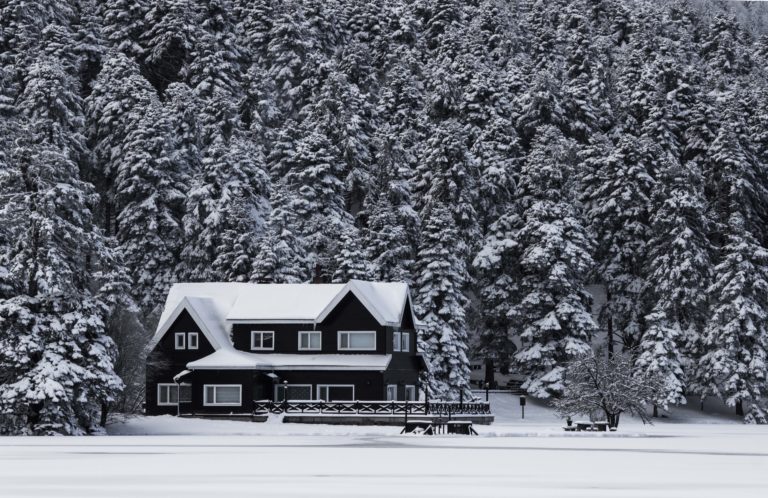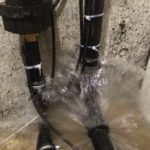
We all may be dreaming of a winter wonderland but, when the mercury plummets to sub-zero temperatures and the winter weather turns frightful, there’s no place like home to stay safe and warm. You, of course, want to protect your property against freezing conditions. Frozen pipes and water damage or only a few of the issues that can cause you winter weather woes and wreak havoc on your home.
Capital Insurance wants to help you protect your home too. That’s why we put together this guide to keeping your home protected this winter – as well as some important information on how your home insurance policy can protect you as well.
Winterizing Your Home
Pipes
During the colder months, exposed pipes run the risk of freezing. The frozen water inside creates a blockage that can lead to your pipes bursting.
Insulate any exposed pipes to prevent freezing and potential damage. This will keep the water inside from freezing as well as prevent ice build up on the outside of the pipe. Running your water regularly will also help to avoid freezing, since moving water is less likely to freeze.
Furnace and Stove
Each year before winter hits, you should inspect your furnace or wood stove or have it inspected by a professional. Clogged air filters and dirty duct work can lead to poor air quality and create breathing issues. More seriously, a malfunctioning furnace could cause a carbon monoxide leak which can potentially lead to poisoning and death.
A professional HVAC technician can perform a thorough inspection and cleaning of your heating system.
Windows
When you’re running a heating system during the winter to keep your home warm, you want to make sure as much of that heat stays in the house as possible.
Windows are a huge culprit when it comes to heat loss – and this could cost you money. Check for leaks, inspect the weather stripping and make sure the windows are properly sealed.
Ice Dams
Ice dams occur when ice builds up on the eaves of the house when snow melts and then freezes. This ice blocks drainage by creating a dam. The water that is unable to drain can damage your roof and enter your home.
You can prevent ice dams by ensuring that the air in your attic remains cool and does not warm up. This warm air causes the snow to melt quickly, creating the risk of refreezing and creating a dam. To keep the air in your attic from getting too warm, make sure your ceilings are properly insulated and your attic is adequately ventilated.
Branches
Removing branches before they fall can help to prevent extensive damage to your home. Ice storms and heavy snowfall can weigh down on branches and cause them to break and fall.
Look for large branches that could potentially fall on your home or electrical wires and have them removed. If it isn’t safe to do it yourself, contact your local power company to report the danger.
Paths, Walkways and Steps
While liability coverage on your home covers injuries caused by slips and falls on your property, you should still prevent potential physical damage by keeping paths, walkways and steps clear of snow and ice.
Shovels, snowblowers and scoops can help to keep snow clear while sand and salt can be used to clear and create traction on ice.
Travel and Protecting Your Home
If you travel away from your home for prolonged periods of time in the winter, you need to take extra precautions to keep your home safe.
Your home is considered “unoccupied” if you are not there for 30 or 60 days, depending on your policy. When this is the case, your insurance company may not cover damages that could have been prevented had you been home (flood, burst pipes, etc.). However, some companies will provide coverage so long as you have someone checking on your home regularly.
Before you go away, there are certain measures you should take to protect your home:
- Talk to your insurance broker to confirm what your policy will cover when away from home.
- Unplug any unnecessary appliances to avoid the risk of fire and reduce phantom loads (energy surges that occur in unused appliances that will contribute to your electricity bill).
- Adjust your furnace temperature high enough to keep pipes from freezing.
- Lower the temperature on your hot water heater to save on electricity.
- Drain your pipes to avoid bursts. Turn off the water main and open the taps until the water stops running. Starting on the top floor, flush all of the toilets. When in doubt, contact a professional plumber.
Insurance Coverage for Winter Damage
While policies can vary from company to company, home insurance providers typically offer the following coverage related to winter damage:
- Damage caused by blowing wind such as debris, ice and branch damage to your home.
- Fallen trees caused by winter weather.
- Liability in the event of injuries caused by slips and falls.
Overall, your insurance policy will likely cover any direct damage to your home caused by winter weather. What insurance policies typically does not cover is damage caused by melting and freezing snow. This includes damage to foundations and floods within the home.
For more information on how a home insurance policy can protect you from the high costs of winter damage, contact one of our specialist brokers at Capital Insurance today!

